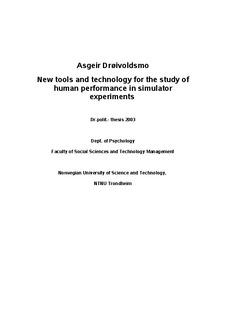| dc.contributor.author | Drøivoldsmo, Asgeir | nb_NO |
| dc.date.accessioned | 2014-12-19T14:24:40Z | |
| dc.date.available | 2014-12-19T14:24:40Z | |
| dc.date.created | 2003-11-07 | nb_NO |
| dc.date.issued | 2003 | nb_NO |
| dc.identifier | 123651 | nb_NO |
| dc.identifier.uri | http://hdl.handle.net/11250/264955 | |
| dc.description.abstract | This thesis suggests that new tools and technology can be used for production of relevant data and insights from the study of human performance in simulator and field experiments. It examines some of the theoretical perspectives behind data collection and human performance assessment, and argues for a high resemblance of the real world and use of subject matter expertise in simulator studies. A model is proposed, suggesting that human performance measurement should be tightly coupled to the topic of study and have a close connection to the time line. This coupling requires new techniques for continuous data collection, and eye movement tracking has been identified as a promising basis for this type of measures.
One way of improving realism is to create virtual environments allowing for controlling more of the environment surrounding the test subjects. New application areas for virtual environments are discussed for use in control room and field studies.
The combination of wearable computing, virtual and augmented (the use of computers to overlay virtual information onto the real world) reality provides many new possibilities to present information to operators. In two experiments, virtual and augmented reality techniques were used to visualise radiation fields for operators in a contaminated nuclear environment. This way the operators could train for and execute their tasks in a way that minimised radiation exposure to the individual operator. Both experiments were successful in proving the concept of radiation visualisation.
Virtual environments allow for early end-user feedback in the design and refurbishment of control room man-machine interfaces. The practical usability of VR in the control room setting was tested in two control room design experiments. The results show that with the right tools for solving the tasks under test, even desktop presentations of the virtual environment can provide sufficient resemblance of the real world.
Computerised data collection was identified as a key factor for efficient data handling in simulator and field experiments. An Internet based questionnaire system was specified and implemented in parallel with the experimental work, and functionality was developed to fulfil the special needs of each new experimental setting. The result is a computer platform independent system capable of handling most types of data and test situations for data collection by Internet or local computer networks. | nb_NO |
| dc.language | eng | nb_NO |
| dc.publisher | Fakultet for samfunnsvitenskap og teknologiledelse | nb_NO |
| dc.relation.haspart | Drøivoldsmo, A; Louka, MN. Virtual reality tools for testing control room concepts. Instrument Engineers' Handbook: 299-306, 2002. | nb_NO |
| dc.relation.haspart | Drøivoldsmo, A. Study of errors by means of simulation and training. Human error and system design and management: 201-206, 2000. | nb_NO |
| dc.relation.haspart | Drøivoldsmo, A; Skraaning, G; Sverrbo, M; Dalen, J; Grimstad, T; Andresen, G. Continuous measures of situation awareness and workload (HWR-539). , 1998. | nb_NO |
| dc.relation.haspart | Nystad, E; Drøivoldsmo, A; Sebok, A. Use of radiation maps in a virtual training environment for NPP field operators. Proceedings of the man-machine systems research sessions at the enlarged Halden programme group meeting - Gol, Norway, 8th to 13 September 2002, 2002. | nb_NO |
| dc.relation.haspart | Nystad, E; Helgar, S; Drøivoldsmo, A. Virtual reality verification of workplace design guidelines: A follow-up study. Proceedings of the man-machine systems research sessions at the enlarged Halden programme group meeting, Gol, Norway, 8th to 13 September 2002, 2002. | nb_NO |
| dc.relation.haspart | Drøivoldsmo, A. The Halden Questionnaire help pages [On-line]. Available: http://psyweb.svt.ntnu.no/asgeird. . | nb_NO |
| dc.subject | | en_GB |
| dc.subject | Psykologi | en_GB |
| dc.subject | SOCIAL SCIENCES: Social sciences: Psychology | en_GB |
| dc.title | New Tools and Technology for the Study of Human Performance in Simulator Experiments | nb_NO |
| dc.type | Doctoral thesis | nb_NO |
| dc.source.pagenumber | 208 | nb_NO |
| dc.contributor.department | Norges teknisk-naturvitenskapelige universitet, Fakultet for samfunnsvitenskap og teknologiledelse | nb_NO |
| dc.description.degree | dr.polit. | nb_NO |
| dc.description.degree | dr.polit. | en_GB |
